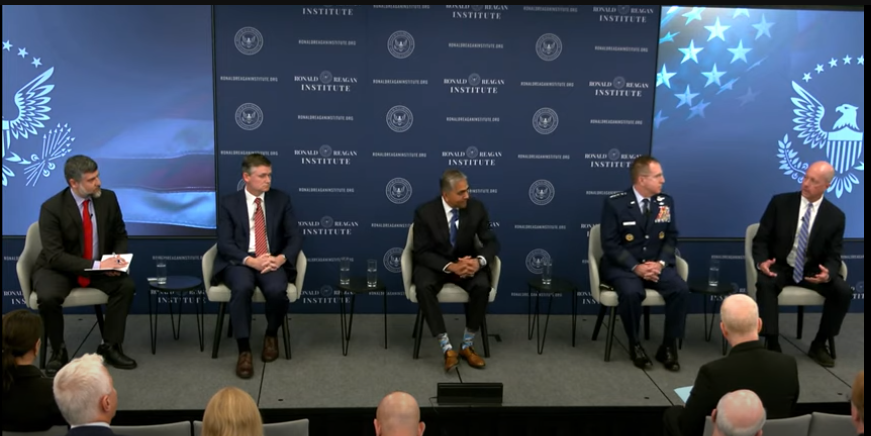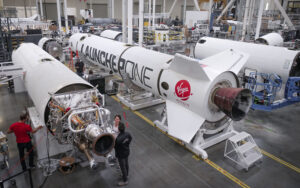Space a Bright Spot Amid U.S. Security Innovation Woes
21st Mar 2024
The Ronald Reagan Foundation in Washington, DC, released its National Security Innovation Base Report Card on 19th March. The institute held a summit on 20th March to discuss the issues and trends uncovered in the preparation of the security innovation report card.
This year, the foundation included a panel discussion on innovation in space. The space industry and its connections with the government can be seen as an exception to the problems under the Defense Modernization indicator. There are problems, such as a “degrading” talent base due to 1/3 of the relevant workforce being at or near retirement age. However, in terms of cooperation between government and industry, the panelists pointed to concrete successes and improvements.
The panel included:
- Gen. Michael A. Guetlein, Vice Chief of Space Operations, U.S. Space Force
- Sen. Mark Kelly, U.S. Senate, Arizona
- Mr. Joe Laurienti, Founder and CEO, Ursa Major
- Dr. Christopher Scolese, Director, National Reconnaissance Office (NRO)
- Moderator: Ms. Jacqueline Feldscher, Managing Editor, Payload
Security innovation in space
Dr. Scolese pointed out that in terms of innovation, the space sector is moving in the right direction, and that the NRO was launching a set of satellites on 21st March to test new devices. ” On the space side, we’re constantly innovating. We’re going to the commercial sector with problems to be solved.”
Senator Kelly, a former astronaut, pointed out that the space environment has been rapidly changing. “We’re seeing proliferation in LEO, MEO, and GEO and are working on what we have to do to counter those. The next big conflict between near-peer competitors will involve some sort of kinetic weaponry in space. The U.S. has been trying deterrence, and making sure that we’re more capable than they are. So far, we’ve been successful. Now, we’re asking ourselves, ‘Where do we need to be 10-20 years from now? How do we get there?’
Connections with industry
General Guetlein, Mr. Laurienti, and Dr. Scolese all pointed to the ability of Space Force and the NRO to interact with industry now. Dr. Scolese emphasized that, “If you’ve been out of the industry in the last 12 months, you wouldn’t recognize where you are. We are actively trying to make it easy for small business to learn how to work with the government. We’ve set up a one-stop storefront, where you can find out everything you need to work with us, and we reach out to industry now with our problems, and discuss solutions. We’ve instituted Industry Days, where we open the doors and talk.”
Regarding the talent base, he pointed out that, “we’re relatively successful at bringing people in, and working with a lot of advanced technologies… but for filling gaps, especially in IT and networking, we reach out to industry.”
No silos
General Guetlein said that, “Everyone wants to come to Space Force, it’s still the case, and we have more applicants than we can intake. We are also able to leverage direct commissions; we can bring in someone as a colonel even without prior government experience. Also, we have good relations with NRO. We send Guardians and Arimen into the NRO and then back to Space Force.”
Both agencies also reach out to the Venture Capital industry to discuss what directions they are taking, and, surprisingly, to share tips. If one side sees a technology or a business that “could be interesting”, the other side hears about it.
Doing these things has built relationships and has shrunk develop times from 5-10 years to 2-3.
Prioritize new manufacturing capabilities.

![[UPDATED] SpaceX Moves Its Dragon Capsule To Make Room For The Boeing Starliner (Watch Live) [UPDATED] SpaceX Moves Its Dragon Capsule To Make Room For The Boeing Starliner (Watch Live)](https://orbitaltoday.com/wp-content/uploads/2024/03/Starliner-1-300x169.jpeg)
![Beyond Earth’s Blue: What Are the Water Worlds Across the Solar System? [A Comparative Analysis] Beyond Earth’s Blue: What Are the Water Worlds Across the Solar System? [A Comparative Analysis]](https://orbitaltoday.com/wp-content/uploads/2024/03/water-in-solar-system-1-300x144.jpg)



Thank you for your comment! It will be visible on the site after moderation.